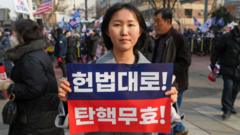**In the wake of Yoon's controversial martial law attempt, a growing anti-communist sentiment is fostering fears about national security and democratic integrity, revealing a deepening societal divide.**
**South Korea's Political Divide: The Rise of Conspiracy Theories Amidst Impeachment Chaos**

**South Korea's Political Divide: The Rise of Conspiracy Theories Amidst Impeachment Chaos**
**As South Korea grapples with the impeachment of President Yoon Suk Yeol, conspiracy theories surrounding unity with North Korea are gaining traction among supporters.**
On a frigid January day, a young pharmacy student named Shin Jeong-min found herself anxiously waiting outside South Korea's Constitutional Court. Amid the chaos of a hearing regarding the impeachment of President Yoon Suk Yeol, she joined hundreds of fervent supporters rallying for his release. Their chants echoed: "Release him now. Cancel his impeachment.” Jeong-min voiced a chilling theory echoing among Yoon's most zealous followers, suggesting that a change in leadership would lead to unification with North Korea under Kim Jong Un and a drift towards communism in the South.
At just 22 years old, Jeong-min contrasts sharply with the older generations of South Koreans who survived the dire aftermath of the Korean War. Many of these elderly citizens, now in their 60s and 70s, have long held fears of North Korea, reflecting decades of anti-communist sentiment cultivated through personal experiences from the Cold War era.
In December, Yoon's declaration of martial law — unsuccessfully aimed at consolidating power — was steeped in fear. He asserted, without presenting firm evidence, that the opposition party had been infiltrated by what he deemed "North Korean communist forces" bent on dismantling the nation. This led to swift moves to ban political activities, placing the military in charge of maintaining order.
Two months after his failed coup, a heightened paranoia is palpable among Yoon's supporters, both young and old, many now convinced that their precious democracy teeters on the edge of a leftist dictatorship. One office worker in his 40s emphasized the gravity of their struggles, stating, "This is a war between communism and democracy.” Others articulated a similar urgency, pushing for a swift reinstatement of Yoon to confront the imagined North Korean spies lurking in society.
Historically, the Cold War era bred genuine fears of infiltration. Real instances, such as the attempted assassination of President Park Chung-hee in 1968, loom large in the collective memory. Likewise, the radical left movements of the 1980s were quickly branded as sympathizers of the North, reinforcing anti-communist ideologies that dictated societal norms during times of military dictatorship.
Shin Jin-wook, a sociology professor at Chungang University, elaborates on how anti-communism became a tool for controlling society. Today, however, such immediate threats seem distant, replaced instead by North Korea's advancing nuclear capabilities and cyber warfare. Despite this, the division between South Korea's political factions is stark: the conservative People Power Party prefers a confrontational approach, while the left-leaning Democratic Party advocates for engagement with Pyongyang.
Accusations arise that Yoon exploits historical fears for political gain. With claims of the opposition riddled with sympathizers, he insinuated that last year's parliamentary election results were manipulated with aid from North Korea and China. This has fueled significant outrage among members of the opposition, who argue that Yoon's rhetoric echoes that of past dictators seeking to justify authoritarian measures.
In a society recently awakening to a new wave of conspiracy theories, even many casual observers are beginning to accept sweeping claims as truths. Following Yoon's martial law declaration, some attended pro-Yoon rallies and remarked that their viewpoints on North Korea and leftist infiltration drastically changed, citing newfound understanding gained through various media channels.
Among those attending these events, you might not encounter hardline conspiracy theorists, but rather individuals influenced by Yoon's messages, believing, for instance, that leftist ideologies are entrenched in their society. Anti-Chinese sentiments have also blossomed amongst this group, demonstrably reflected in placards such as "Chinese Communist Party OUT."
Yet, as a cohort of younger South Koreans who have largely never felt direct threat from the North grows increasingly distrustful of China, many rely on dubious narratives suggesting that communism serves as a convenient scapegoat for broader grievances and fears concerning their future.
Political scientist Cho Jin-man contends that for many in their 20s and 30s, frustrations with the state of the economy and job market fuel discontent — and Yoon’s promulgation of communism as a looming danger bolsters a narrative that distracts from systemic issues.
Despite the troubling spread of extreme views among certain demographics, Democratic Party lawmaker Wi Sung-lac remains optimistic about the party's resilience against Yoon's rhetoric. Meanwhile, polling expert Lee Sang-sin raises the alarm, likening Yoon's supporters to a rapidly growing cult with potential long-term ramifications for the nation.
As South Korea stands at this political crossroads, the implications of fear, division, and conspiracy resonate throughout society, raising questions about the future of democracy in the face of escalating tensions both within and beyond its borders.





















